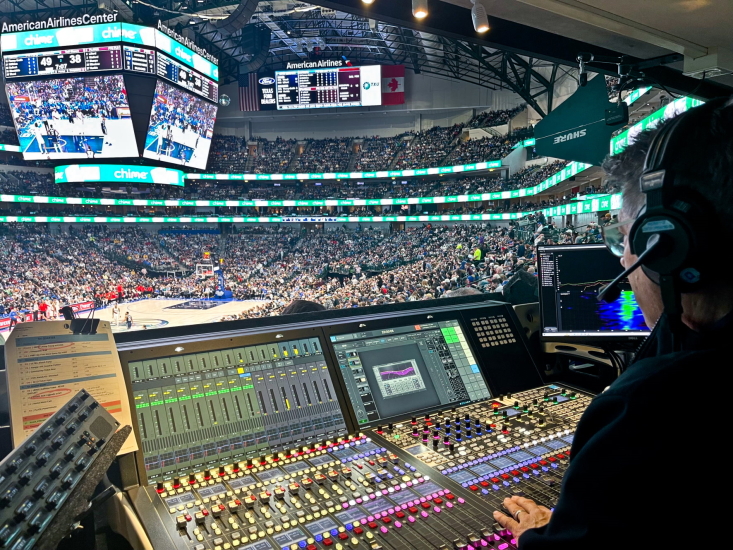American Airlines Center installs Lawo IP System

American Airlines Center, one of the busiest arenas in North America, is home to the NHL's Dallas Stars and NBA's Dallas Mavericks. Opened in 2001, the AAC has been focused on ensuring that the fan experience is industry-leading. The Stars and Mavericks like to push the envelope to put on a superior show for their fans. In addition to the baseball games, the AAC hosts several concert tours each year and many private events. For a superior sonic experience and with a view to future-proofing its infrastructure, the Center recently invested in a Lawo mc²56 MkIII mixing console with redundant A__UHD Cores providing 512 DSPs for the front-of-house and monitor mixes. A Power Core for Dante conversion, Lawo A__madi6 and A__mic8 stageboxes, and a V__pro8 video processor for MADI embedding and LiveView™ video thumbnail generation are also included.
“We are fortunate in that ownership has always been willing to have conversations about investing in the right tools to do the best job we possibly can. Because the Mavericks and Stars are both so keen to deliver top-notch productions, we have seen the primary house audio console change several times since the arena’s inauguration,” states American Airlines Center’s Facility Engineer, Scott Davidson. At one point, it became clear that their previous audio system had come to its limits and needed to be replaced with a future-proof solution. “After researching new consoles, countless hands-on demos, and talking to touring engineers mixing the shows, we agreed that we needed to look elsewhere. On a whim, we decided to reach out to Lawo to see if they had something that might work,” Davidson says.
The American Airlines Center wanted a console able to handle various styles and types of signals, and the ability to support new technology formats as they become relevant. The console needed to provide enough physical knobs and buttons to get the job done, plus intuitive software navigation allowing operators to quickly adapt the desk to their specific workflow requirements.
Tony Staires at Lawo North America arranged for a demo console at the AAC. The team found that the mixing system’s capacity and flexibility allowed engineers to configure the system without compromising on anything. Outstanding instant metering of all various mixes allows operators to visually verify that everything is working and signals are flowing as expected, by looking at just one screen. Waves integration was deemed vital, and the Lawo mc256 was one of the few consoles that could make it happen without shoe-horning additional screens around the desk.
“Having a large number of AUX mixes means we can route signals in a variety of ways and mix sources in a more discrete fashion than before,” said Jeff McGinnis, A1 Engineer at American Airlines Center. “Not being limited by a fixed console setup is a major benefit of the Lawo system. Having video thumbnails next to the faders is a boon when checking things in advance. We furthermore appreciate the features that are unique to the Lawo, including the various GPI/O options and remote VNC access to other machines so we can grab control of things directly from the console.”
“I like the fact that the console is so customizable with respect to its layout and screen views. Our mc256 desk has dual faders in the left bay and offers 48 faders, plus two large touchscreens, in a surprisingly compact footprint. So, ergonomically, I don’t have to reach too far to do what I need to do. Plus, there is a real knob for most functions. Finally, the Lawo design is sleek enough for your eyes to scan the console and get a reliable ‘live’ impression of what is happening.”
Another point in favor was that the team at the American Airlines Center quickly discovered that each time they talked with Lawo personnel, they learned something new about additional features and options that speed up delivering consistently superior mixes.
“Once you start to wrap your mind around this console and realize the power at your fingertips, your mind instinctively begins thinking of things that no other console can do,” adds Jeff McGinnis. “You realize that you can implement different workflows and options that would not be possible elsewhere.”
“A couple of other features that helped sway our decision,” Scott Davidson explains, “was that Lawo is not just an audio company but also has a very robust IP-based video routing solution that runs on the same backbone infrastructure as our audio console. Plus, Lawo’s solution has growth capabilities/possibilities built in. If we ever need to add a second console for a broadcast-type mix, or for a portable console to use around the building, we can do this with our Lawo system and share resources in a highly flexible way.”
 How to resolve AdBlock issue?
How to resolve AdBlock issue?